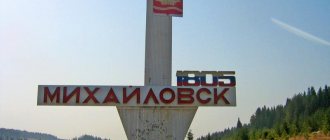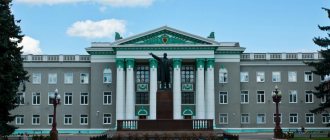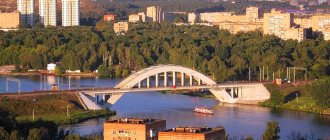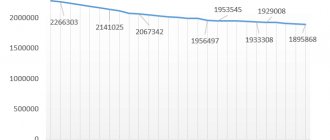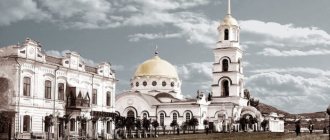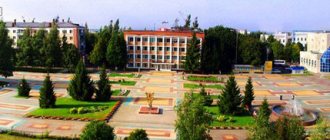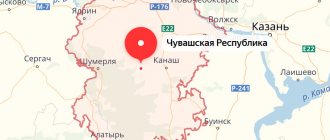This term has other meanings, see Vuktyl (meanings).
Coat of arms
| city of republican significance[1] / urban district[2] | |
| Vuktyl | |
Vuktyl
(Komi Vuktyl) - an administrative-territorial unit (an administrative-territorial entity - a city of republican significance with a territory subordinate to it)[5] and a municipal entity (urban district with the official name of the
municipal entity of the urban district "Vuktyl"
)[6] as part of the Russian Komi Republic Federation.
The administrative center is the city of Vuktyl.
The city of Vuktyl and the settlements subordinate to its administration are equated to the regions of the Far North.[7]
It is planned to transform the urban district into a municipal district[8].
Story
The Vuktylsky district was formed on February 21, 1975 at the expense of the territories of the Pechora and Ukhta city councils. ICDO "Vuktyl" was formed in accordance with the Law of the Russian Federation No. 131-FZ dated October 6, 2003 in 2005.
In the Vuktyl region, the Timan-Pechora superdeep well (SG-5) with a depth of 6904 meters was drilled in 1984-1993.
On September 13, 2015, residents of the district voted in a referendum to change the status of the municipal district to a city district, and the Council of the Vuktyl municipal district addressed this proposal to the State Council of the Komi Republic, which adopted the corresponding law in December 2015[9].
External links [edit]
- Mozhgorod.ru. Introduction to Vuktyl (in Russian)
| vteAdministrative division of the Komi Republic | |||
| Capital: Syktyvkar • Countryside. | |||
| Administrative regions |
| ||
| Cities and towns |
| ||
| Urban settlements |
| ||
Population
| Population | ||||||
| 2009[10] | 2010[11] | 2011[10] | 2012[12] | 2013[13] | 2014[14] | 2015[15] |
| 16 209 | ↘14 873 | ↘14 753 | ↘14 248 | ↘13 790 | ↘13 261 | ↘12 728 |
| 2016[16] | 2017[17] | 2018[18] | 2019[19] | 2020[4] | ||
| ↘12 348 | ↘12 042 | ↘11 797 | ↘11 494 | ↘11 401 | ||
Urbanization
84.83% of the district's population live in urban areas (the city of Vuktyl).
Ethnic composition of Vuktyl according to the 2010 census:[20]
- Total - 14873 people.
- Russians - 9986 people. (72.3%),
- Komi - 1489 people. (10.8%),
- Ukrainians - 1142 people. (8.3%)
- Tatars - 220 people. (1.6%)
- Belarusians - 195 people. (1.4%)
- Chuvash - 161 people. (1.2%)
- Germans - 105 people. (0.8%)
- those who indicated their nationality - 13,804 people. (100.0%).
Climate
The climate of Vuktyl is moderate continental with long winters and short summers.
The city of Vuktyl is equated to the regions of the Far North.
- Average annual air temperature - −1.3 °C
- Relative air humidity - 77.2%
- Average wind speed - 3.1 m/s
| Average daily air temperature in Vuktyl | ||||||||||||
| Jan from −49.5 to 2.5 | Feb from −47.3 to 1.6 | Mar from −38.8 to 10.0 | Apr from −31.4 to 22.0 | May from −19.4 to 29.9 | Jun from −4.2 to 32.8 | Jul from 0.4 to 34.2 | Aug from −2.9 to 31.8 | Sep from −8.8 to 26.7 | Oct from −21.6 to 18.1 | Nov from −43.1 to 6.0 | Dec from −50.1 to 3.2 | Year from −50.1 to 2.2 |
| −17.9 °C | −15.6 °C | −7.8 °C | −2.0 °C | 5.1 °C | 12.9 °C | 16.2 °C | 12.0 °C | 6.6 °C | −0.6 °C | −10.4 °C | −15.2 °C | −1.3 °C |
Administrative-territorial structure
The administrative-territorial structure, status and boundaries of the city of republican significance of Vuktyl with its subordinate territory are established by the Law of the Komi Republic of March 6, 2006 No. 13-RZ “On the administrative-territorial structure of the Komi Republic”[21]
The administrative-territorial entity includes 5 administrative territories:
| № | Administrative territory | Administrative center | Settlements | Number of settlements |
| 1 | city of republican significance Vuktyl with adjacent territory | Vuktyl city | Vuktyl city | 1 |
| 2 | the village of Dutovo with its subordinate territory | village of Dutovo | Dutovo village, Lemty village, Savinobor village, Sherdino village | 4 |
| 3 | rural-type settlement Lemtybozh with its subordinate territory | Lemtybozh village | Lemtybozh village | 1 |
| 4 | the village of Podcherye with its subordinate territory | Podcherye village | Podcherye village, Kyrta village | 2 |
| 5 | rural-type settlement Ust-Soplesk with its subordinate territory | Ust-Soplesk village | Ust-Soplesk village, Ust-Voya village, Ust-Shchuger village | 3 |
Municipal-territorial structure
Until December 2015, the Vuktyl municipal district included one urban and four rural settlements:
| № | Urban and rural settlements | Administrative center | Number of settlements | Population | Area, km2 |
| 1 | Vuktyl | Vuktyl city | 1 | ↘10 430[16] | 72,94[3] |
| 2 | Dutovo | village of Dutovo | 4 | ↘1010[16] | 76,11[3] |
| 3 | Lemtybozh | Lemtybozh village | 1 | ↘173[16] | 23,75[3] |
| 4 | Sub-daughter | Podcherye village | 2 | ↘601[16] | 7,74[3] |
| 5 | Ust-Soplesk | Ust-Soplesk village | 3 | ↘134[16] | 9,78[3] |
In December 2015, all municipalities were abolished, and a city district was formed on the territory of the municipal district.
Geographical position
The city of Vuktyl is located in the Urals, on the right coast of Pechora . The total area of the city is 22.4 thousand sq. km. Population: 11,200 people. (as of 2014). Komi, Russians and Ukrainians live in the city. Vuktyl is the administrative center of the municipality of the same name (63°52 N 57°19 E).
Climate
The city has a temperate continental climate. Winter is long and cold, summer is short. Average temperatures in winter are -1.3 degrees Celsius, in summer +15.7 degrees Celsius. The city district is equated to the regions of the Far North. The average annual precipitation is 556 mm.
Natural attractions
Vuktyl is located on the right bank of the river. Pechory . The main rivers of the region are also the tributaries of the Pechora - Shchugor, Vuktyl, Podcherye . In the city area there is the highest peak of the Northern Urals (1617 m), as well as 8 Ural peaks above 1000 m.
Coniferous forests of the middle and northern taiga subzone predominate. On the territory of the Vuktyl region, deposits of various minerals have been found, such as fossil fuels - oil, natural gas, bitumen, coal; metallic minerals - tin, gold, vanadium, molybdenum, iron, quartzites; non-metallic minerals - asbestos, clays, mineral waters.
Near the city there is the national park “Yugyd Va” (“bright water”), a real pearl of Vuktyl . The neighbor of the Yugyd-va National Park in the south is the Pechora-Ilychsky Nature Reserve .
Story
The history of the city began in 1959, when a helicopter first landed here. In 1962, drilling of the first gas well began, and in 1966 a new settlement was formed. On August 21, 1984, the workers' settlement was given the status of a city. Now in the city of Vuktyl there is a cultural and sports complex, a 3D cinema, a swimming pool and a gym. In 2011, a monument to Cheburashka and Gene was unveiled Vuktyl . During the winter holidays, you can admire extraordinary snow figures - for example, Bender from Futurama, and Kung Fu Panda from the cartoon of the same name.
This small town is especially proud of the Northern Lights gas pipeline, which originates here. Vuktyl is distinguished by its cultural development. There are more than 20 sports and cultural institutions in the area: libraries, music and entertainment venues, art schools. Recently, folk festivals, recreation evenings for WWII participants and home front workers, the regional “Rally of Soldiers’ Mothers”, the “Northern Beads” festival, City Day, and other events have become popular.
How to get there
The main road that crosses the area is Vorkuta - Vuktyl . The main railway "Kotlas - Vorkuta" is located 160 km from the city of Vuktyl . The nearest stations are Ukhta, as well as Sosnogorsk, Chikshino, Pechora.
The city is home to the Vuktyl airport.
Compound
The administrative-territorial entity and urban district includes 11 settlements:[21]
| № | Locality | Type of settlement | Population |
| 1 | Vuktyl | city, administrative center | ↘9671[22] |
| 2 | Dutovo | village | 957[11] |
| 3 | Kyrta | village | 66[11] |
| 4 | Lemty | village | 221[11] |
| 5 | Lemtybozh | village | ↗174[15] |
| 6 | Sub-daughter | village | 710[11] |
| 7 | Savinobor | village | 15[11] |
| 8 | Ust-Voya | village | 20[11] |
| 9 | Ust-Soplesk | village | 151[11] |
| 10 | Ust-Shchuger | village | 27[11] |
| 11 | Sherdino | village | 122[11] |
Notes
- from the point of view of the administrative-territorial structure
- from the point of view of the municipal structure
- ↑ 123456
(Komi Republic. Total land area of the municipality - ↑ 12
Population of the Russian Federation by municipalities as of January 1, 2022 (Russian). Date accessed: October 17, 2022. Archived October 17, 2022. - Constitution of the Komi Republic; Law of the Komi Republic of March 6, 2006 N 13-RZ “ON THE ADMINISTRATIVE-TERRITORIAL STRUCTURE OF THE KOMI REPUBLIC” (as amended as of 05/06/2016)
- City District Charter
- List of regions of the Far North and equivalent areas
- Komi saw the need for municipal districts
- Law of the Komi Republic of December 1, 2015 No. 114-RZ “On the transformation of municipalities of the municipal district “Vuktyl” in the Komi Republic and amendments in this regard to the Law of the Komi Republic “On the territorial organization of local self-government in the Komi Republic”
- ↑ 12
Resident population estimate as of January 1 - ↑ 1 2 3 4 5 6 7 8 9 10 All
-Russian population census 2010.
Population of urban districts, municipal areas, settlements and populated areas (undefined)
. Access date: December 29, 2014. Archived December 29, 2014. - Population of the Russian Federation by municipalities. Table 35. Estimated resident population as of January 1, 2012 (unspecified)
. Retrieved May 31, 2014. Archived May 31, 2014. - Population of the Russian Federation by municipalities as of January 1, 2013. - M.: Federal State Statistics Service Rosstat, 2013. - 528 p. (Table 33. Population of urban districts, municipal districts, urban and rural settlements, urban settlements, rural settlements) (undefined)
. Retrieved November 16, 2013. Archived November 16, 2013. - Population estimate for urban districts, municipal districts, settlements and urban settlements of the Komi Republic as of January 1, 2014 (unspecified)
. Retrieved March 22, 2014. Archived March 22, 2014. - ↑ 1 2
Population of the Russian Federation by municipalities as of January 1, 2015
(unspecified)
. Access date: August 6, 2015. Archived August 6, 2015. - ↑ 123456
Population of the Russian Federation by municipalities as of January 1, 2016 (Russian) (October 5, 2018). Retrieved May 15, 2022. Archived May 8, 2022. - Population of the Russian Federation by municipalities as of January 1, 2022 (Russian) (July 31, 2017). Retrieved July 31, 2022. Archived July 31, 2022.
- Population of the Russian Federation by municipalities as of January 1, 2022 (Russian). Retrieved July 25, 2018. Archived July 26, 2022.
- Population of the Russian Federation by municipalities as of January 1, 2022 (Russian). Retrieved July 31, 2019. Archived May 2, 2022.
- Results of the 2010 All-Russian Population Census for the Komi Republic (unspecified)
(inaccessible link). Retrieved November 14, 2016. Archived November 15, 2016. - ↑ 12
Law of the Komi Republic of March 6, 2006 No. 13-RZ “On the administrative-territorial structure of the Komi Republic” - The permanent population of the Russian Federation by municipalities as of January 1, 2022 (Russian). Retrieved April 27, 2022. Archived May 2, 2022.
Excerpt characterizing Vuktyl (urban district)
Moscow, meanwhile, was empty. There were still people in it, a fiftieth of all the former inhabitants still remained in it, but it was empty. It was empty, just as a dying, exhausted hive is empty. There is no longer any life in a dehumidified hive, but at a superficial glance it seems just as alive as the others. The bees hover just as happily in the hot rays of the midday sun around the dehumed hive, as around other living hives; it also smells like honey from afar, and bees fly in and out of it. But you have to take a closer look at it to understand that there is no longer life in this hive. Bees fly differently than in living hives; the wrong smell, the wrong sound amazes the beekeeper. When a beekeeper knocks on the wall of a sick hive, instead of the previous, instant, friendly response, the hiss of tens of thousands of bees, menacingly pressing their butts and quickly beating their wings producing this airy vital sound, he is answered by scattered buzzing sounds echoing in different places of the empty hive. From the entrance there is no smell, as before, of the alcoholic, fragrant smell of honey and poison, it does not bring from there the warmth of fullness, and the smell of emptiness and rot merges with the smell of honey. At the entrance there are no more guards preparing to die for protection, raising their butts in the air, trumpeting the alarm. There is no longer that even and quiet sound, the fluttering of labor, similar to the sound of boiling, but the awkward, disjointed noise of disorder is heard. Black oblong robber bees, smeared with honey, timidly and evasively fly in and out of the hive; they do not sting, but escape from danger. Previously, they only flew in with burdens, and empty bees flew out, now they fly out with burdens. The beekeeper opens the bottom well and peers into the lower part of the hive. Instead of the previously black lashes of succulent bees, pacified by labor, holding each other’s legs and pulling the foundation with a continuous whisper of labor, sleepy, shriveled bees wander in different directions absent-mindedly along the bottom and walls of the hive. Instead of a floor cleanly sealed with glue and swept away by fans of wings, at the bottom lie crumbs of wax, bee excrement, half-dead bees, barely moving their legs, and completely dead, untidy bees. The beekeeper opens the top well and examines the head of the hive. Instead of continuous rows of bees, clinging to all the spaces of the honeycombs and warming the babies, he sees the skillful, complex work of the honeycombs, but no longer in the form of virginity in which it was before. Everything is neglected and dirty. Robbers - black bees - scurry quickly and stealthily around the work; their bees, shriveled, short, lethargic, as if old, slowly wander, not bothering anyone, not wanting anything and having lost consciousness of life. Drones, hornets, bumblebees, and butterflies knock stupidly on the walls of the hive in flight. In some places, between the wax fields with dead children and honey, angry grumbling is occasionally heard from different sides; somewhere two bees, out of old habit and memory, cleaning the nest of the hive, diligently, beyond their strength, drag away a dead bee or bumblebee, not knowing why they are doing this. In another corner, two other old bees are lazily fighting, or cleaning themselves, or feeding one another, not knowing whether they are doing it in a hostile or friendly manner. In the third place, a crowd of bees, crushing each other, attacks some victim and beats and strangles it. And the weakened or killed bee slowly, lightly, like fluff, falls from above into a pile of corpses. The beekeeper unfolds the two middle foundations to see the nest. Instead of the previous solid black circles of thousands of bees sitting back and forth and observing the highest secrets of their native work, he sees hundreds of dull, half-dead and sleeping skeletons of bees. Almost all of them died, without knowing it, sitting on the shrine that they cherished and which no longer exists. They smell of rot and death. Only some of them move, rise, sluggishly fly and sit on the enemy’s hand, unable to die, stinging him - the rest, dead, like fish scales, easily fall down. The beekeeper closes the well, marks the block with chalk and, having chosen the time, breaks it out and burns it. So empty was Moscow when Napoleon, tired, restless and frowning, walked back and forth at the Kamerkollezhsky Val, waiting for that, although external, but necessary, according to his concepts, observance of decency - a deputation. In different corners of Moscow people were still moving senselessly, keeping old habits and not understanding what they were doing. When it was announced to Napoleon with due caution that Moscow was empty, he looked angrily at the person who reported this and, turning away, continued to walk in silence. “Bring the carriage,” he said. He got into the carriage next to the adjutant on duty and drove to the suburbs. - “Moscow deserte. Quel evenemeDt invraisemblable!” [“Moscow is empty. What an incredible event!”] he said to himself. He did not go to the city, but stopped at an inn in the Dorogomilovsky suburb. Le coup de theater avait rate. [The end of the theatrical performance failed.] Russian troops passed through Moscow from two o'clock in the morning until two o'clock in the afternoon and carried away with them the last residents and wounded who were leaving. The biggest crush during the movement of troops occurred on the Kamenny, Moskvoretsky and Yauzsky bridges. While, bifurcated around the Kremlin, the troops crowded onto the Moskvoretsky and Kamenny bridges, a huge number of soldiers, taking advantage of the stop and crowded conditions, returned from the bridges and stealthily and silently snuck past St. Basil's and under the Borovitsky Gate back up the hill to Red Square, on which, by some instinct, they felt that they could easily take someone else’s property. The same crowd of people, as if for cheap goods, filled Gostiny Dvor in all its passages and passages. But there were no tenderly sugary, alluring voices of the hotel guests, there were no peddlers and a motley female crowd of buyers - there were only the uniforms and greatcoats of soldiers without guns, silently leaving with burdens and entering the ranks without burdens. Merchants and peasants (there were few of them), as if lost, walked among the soldiers, unlocked and locked their shops, and themselves and the fellows carried their goods somewhere. Drummers stood on the square near Gostiny Dvor and beat the collection. But the sound of the drum forced the robber soldiers not, as before, to run to the call, but, on the contrary, forced them to run further away from the drum. Between the soldiers, along the benches and aisles, people in gray caftans and with shaved heads could be seen. Two officers, one in a scarf over his uniform, on a thin dark gray horse, the other in an overcoat, on foot, stood at the corner of Ilyinka and talked about something. The third officer galloped up to them. “The general ordered everyone to be expelled now at any cost.” What the hell, it doesn't look like anything! Half the people fled. “Where are you going?.. Where are you going?” he shouted at three infantry soldiers who, without guns, having picked up the skirts of their greatcoats, slipped past him into the ranks. - Stop, rascals! - Yes, please collect them! - answered another officer. – You can’t collect them; we have to go quickly so that the last ones don’t leave, that’s all! - How to go? they stood there, huddled on the bridge and didn’t move. Or put a chain so that the last ones don’t run away? - Yes, go there! Get them out! - the senior officer shouted. The officer in the scarf got off his horse, called the drummer and went with him under the arches. Several soldiers began to run in a crowd. The merchant, with red pimples on his cheeks near his nose, with a calmly unshakable expression of calculation on his well-fed face, hastily and dapperly, waving his arms, approached the officer. “Your honor,” he said, “do me a favor and protect me.” It’s not a small matter for us, it’s our pleasure! Please, I’ll take out the cloth now, at least two pieces for a noble man, with our pleasure! Because we feel, well, this is just robbery! You're welcome! They should have put a guard there, or at least let them lock him up... Several merchants crowded around the officer. - Eh! it's a waste of time to lie! - said one of them, thin, with a stern face. “When you take off your head, you don’t cry over your hair.” Take whatever you like! “And he waved his hand with an energetic gesture and turned sideways to the officer. “It’s good for you, Ivan Sidorich, to speak,” the first merchant spoke angrily. - You are welcome, your honor. - What should I say! – the thin man shouted. “I have a hundred thousand goods in three shops here.” Can you save it when the army has left? Eh, people, God’s power cannot be broken by hands! “Please, your honor,” said the first merchant, bowing. The officer stood in bewilderment, and indecision was visible on his face. - What do I care! - he suddenly shouted and walked with quick steps forward along the row. In one open shop, blows and curses were heard, and while the officer was approaching it, a man in a gray overcoat and with a shaved head jumped out of the door. This man, bending over, rushed past the merchants and the officer. The officer attacked the soldiers who were in the shop. But at that time, terrible screams of a huge crowd were heard on the Moskvoretsky Bridge, and the officer ran out onto the square.
